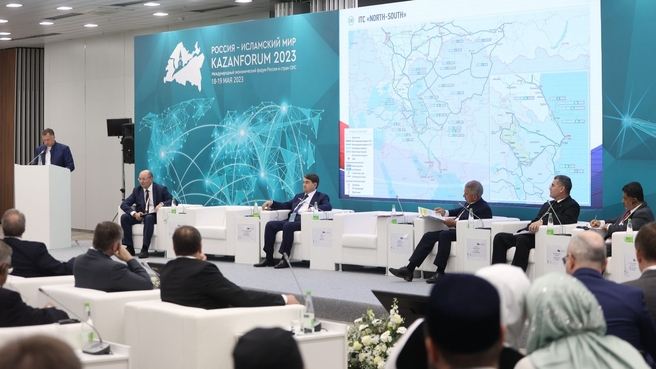Marat Khusnullin took part in a roundtable discussion on developing the North-South international transport corridor at the 14th International Economic Forum “Russia - Islamic World: KazanForum”
Deputy Prime Minister Marat Khusnullin took part in a roundtable discussion on the development of the North-South international transport corridor at the 14th International Economic Forum “Russia - Islamic World: KazanForum.” The Deputy Prime Minister noted that the corridor had acquired special significance in the current geopolitical situation as Russia restructures logistics chains and freight volumes.
“The development of transit corridors in the Caspian region, South and Southeast Asia, and the Persian Gulf is a priority for the Russian Federation. We are constantly working to increase trade between friendly countries and are certainly interested in the development of the North-South corridor. We believe that by 2025, the cargo volume on this route should double to at least 30 million tonnes, and by 2030 – up to 35 million tonnes. This is 155 percent more than in 2021,” said Marat Khusnullin.
The North-South corridor includes three main routes: the western route through the Republic of Dagestan by road and rail; the trans-Caspian route through the Caspian Sea by sea and river transport along the Volga to Iranian and Turkmen ports; and the eastern route through the republics of Kazakhstan and Turkmenistan by road and rail.
The Deputy Prime Minister explained that highway bypasses are to be built in Astrakhan, Derbent and Khasavyurt to develop the international transport route inside Russia. In addition, the overhaul of R-217 Caucasus Motorway is progressing, and the Caspian basin ports in the Astrakhan Region and the Republic of Dagestan are being upgraded. To increase capacity at Russian border points, a railway checkpoint at Derbent is being built and the Upper Lars and Yarag-Kazmalyar checkpoints are being upgraded. The total investment in the development of the North - South transport artery between 2022 and 2030 will total about 280 billion roubles, Marat Khusnullin added.
He said the Government is also developing the West-East international transport corridor with connections to Kazakhstan, Mongolia, and China. Construction of the M-12 Motorway is underway from Moscow to Kazan via Nizhny Novgorod to be extended to Yekaterinburg, Tyumen and eventually to Vladivostok.
“I believe it is crucial to synchronise our actions with our foreign colleagues. Infrastructure development plans must be designed jointly with the republics of Kazakhstan, Azerbaijan, Turkmenistan, Tajikistan, Uzbekistan, Iraq, India, and the Islamic Republic of Iran to avoid bottlenecks on the route and to ensure the smooth financial performance of the infrastructure,” the Deputy Prime Minister said.
He pointed out that the day before Russian President Vladimir Putin and President of the Islamic Republic of Iran Ebrahim Raisi took part, via videoconference, in the ceremony of signing an intergovernmental agreement on cooperation in building a railway line between the Iranian cities of Rasht and Astara to develop transport along the North-South corridor.
“The completion of this project will be a major breakthrough and will allow for shipping up to 15 million tonnes of cargo from Russia to the Persian Gulf countries,” Marat Khusnullin said.
Head of the Republic of Tatarstan Rustam Minnikhanov called the North-South international transport corridor a key element in the Eurasian transport framework.
“This corridor has special significance for the Eurasian Economic Union as an important alternative corridor for economic development and as a response to the economic and political impact of the European Union. We always discuss the topic of transport corridors and logistics during our foreign trips and meetings. Last year we were in Iran and saw how interested the Iranian side was in the progress in this direction. The same is true of Turkmenistan, Uzbekistan, and Kazakhstan. So, these issues are the most important ones,” Rustam Minnikhanov said.
Igor Levitin, Aide to the President of Russia, thanked the organisers and participants of the discussion for their productive discussion.
“Together we must create new conditions for moving goods. The North - South transport corridor, unlike other world routes, is multimodal, all modes of transport are involved here,” said Igor Levitin. The Presidential aide explained that it’s necessary for cargo to be shipped through to its destination without border stops. He added that currently the technology is available to do that.
The roundtable discussion was also attended by Director General of the Agency for Transport and Communications under the Cabinet of Ministers of the Republic of Turkmenistan Mammethan Chakyev, Minister of State for Foreign Trade of the UAE Thani bin Ahmed Al Zeyoudi, First Deputy Minister of Agriculture of the Islamic Republic of Iran Alireza Peyman-Pak, and Minister of Transport, Communications and Information Technology of the Sultanate of Oman Said bin Hamood Al Mawali.













